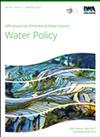A novel framework for planning policy and responsible stakeholders in industrial wastewater reuse projects: a case study in Iran
IF 1.8
4区 环境科学与生态学
Q4 WATER RESOURCES
引用次数: 4
Abstract
Industrial wastewater recycling projects are mainly used for alleviation of both water scarcity and contamination of freshwater bodies. These projects mainly address major challenges related to technological and economic aspects rather than stakeholders’ responsibility. Hence, little is known for the role of responsible stakeholders as a major part of planning policy, which requires recognition of their crucial role and integration into associated procedures. This paper presents a new decision support framework to identify responsible stakeholders and reveal the role of their motivations. The approach integrates qualitative and frequency analysis methods into a comprehensive framework to identify the problems over the project lifetime from visible to their roots and link them together with stakeholders through deep mapping. The planning policy framework is applied to a real-world case study of industrial parks in Iran. The results of the case study show that visible economic, social, and technological problems are caused by responsible stakeholders with no direct role in those projects. Additionally, deep mapping analysis shows various deep roots caused by the government and industry are linked to visible problems across all project phases that are related to the role of stakeholders, their behaviour, and deep beliefs.工业废水回用项目中规划政策和负责任利益相关者的新框架:伊朗案例研究
工业废水回收项目主要用于缓解缺水和淡水水体污染。这些项目主要解决与技术和经济方面有关的重大挑战,而不是利益攸关方的责任。因此,作为规划政策的主要组成部分,负责任的利益相关者的作用鲜为人知,这需要承认他们的关键作用并纳入相关程序。本文提出了一个新的决策支持框架,以确定负责任的利益相关者,并揭示他们动机的作用。该方法将定性和频率分析方法集成到一个全面的框架中,以从根源上识别项目生命周期中的问题,并通过深度映射将其与利益相关者联系在一起。规划政策框架应用于伊朗工业园区的真实案例研究。案例研究的结果表明,可见的经济、社会和技术问题是由在这些项目中没有直接作用的负责任的利益相关者造成的。此外,深度映射分析显示,政府和行业造成的各种深层次根源与所有项目阶段的可见问题有关,这些问题与利益相关者的角色、他们的行为和深层次信念有关。
本文章由计算机程序翻译,如有差异,请以英文原文为准。
求助全文
约1分钟内获得全文
求助全文
来源期刊

Water Policy
环境科学-水资源
CiteScore
3.10
自引率
12.50%
发文量
81
审稿时长
6-12 weeks
期刊介绍:
Water Policy will publish reviews, research papers and progress reports in, among others, the following areas: financial, diplomatic, organizational, legal, administrative and research; organized by country, region or river basin. Water Policy also publishes reviews of books and grey literature.
 求助内容:
求助内容: 应助结果提醒方式:
应助结果提醒方式:


